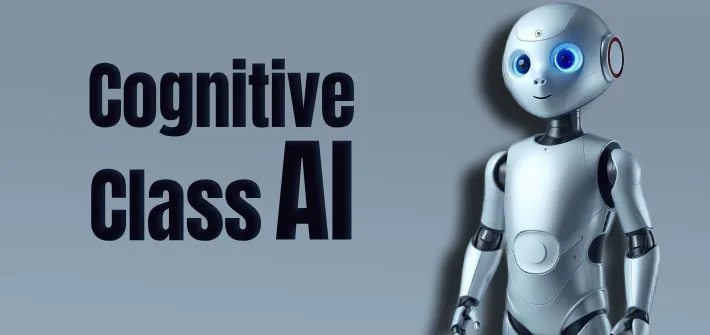In the evolving world of artificial intelligence (AI), understanding how machines think and make decisions is crucial. Cognitive Class AI helps bridge this gap. As technology advances, learning the fundamentals of cognitive AI becomes more important. Cognitive Class AI offers a learning platform designed to teach the connections between cognitive science and artificial intelligence. Therefore, it helps individuals prepare for the future of AI by understanding human-like cognition.
In this article, we will explore what Cognitive Class AI offers. Furthermore, we’ll discuss the significance of cognitive science in shaping AI. Additionally, we will explore how these fields combine to change industries. By studying cognitive AI, you will gain the tools to shape the future of AI and cognitive science. Throughout this article, we’ll also cover common questions, define key terms, and explain the broader impact of these technologies on society.
Table of Contents
What is Cognitive Class AI?
Cognitive Class AI is a platform that provides free, high-quality courses on cognitive computing and AI. Sponsored by IBM, it helps students, professionals, and enthusiasts learn about cognitive artificial intelligence. In addition to cognitive AI, the platform covers topics such as machine learning, data science, and how machines mimic human intelligence. Whether you’re interested in deep learning or natural language processing (NLP), Cognitive Class AI lays the foundation for your understanding.
Why is Cognitive AI Important?
To fully appreciate Cognitive Class AI, you first need to understand cognitive AI. Cognitive AI is about developing systems that mimic how human brains function. In other words, it allows AI systems to incorporate perception, learning, and decision-making. Therefore, cognitive artificial intelligence becomes more adaptive and versatile. The goal is not just to process data but also to interpret and analyze it as humans do.
The concept of cognitive AI is based on the intersection of cognitive science and AI. Cognitive science studies how humans think and process information. Meanwhile, AI seeks to build systems that can perform tasks requiring human intelligence. As a result, the combination of these two fields forms the basis of future AI systems.

Understanding Cognitive Science and Its Impact on AI
Cognitive science is an interdisciplinary field. It combines psychology, neuroscience, philosophy, and computer science. The meaning of cognitive relates to processes like thinking, understanding, and learning. In simple terms, it’s about how humans process information to solve problems and make decisions.
As artificial intelligence develops, researchers are increasingly turning to cognitive science for answers. For instance, they want to build intelligent, adaptable machines. Artificial intelligence needs to incorporate cognitive functions like reasoning and self-awareness. Therefore, cognitive science plays a vital role in shaping the future of AI.
What Cognitive Means in AI
In AI, cognitive refers to the machine’s ability to perform tasks that involve higher-order functions, such as understanding language and recognizing patterns. As a result, cognitive artificial intelligence helps machines think like humans.
For example, cognitive AI systems can interpret the nuances of language. They understand context and can make complex decisions based on that understanding. Therefore, they go beyond merely following commands—they learn from experience and improve their abilities over time.
AI and Cognition: A Symbiotic Relationship
This Ai are closely linked. AI aims to replicate human intelligence, while cognitive science provides the foundation for developing intelligent systems. Therefore, cognitive AI represents a shift from traditional rule-based systems to more dynamic models that evolve as they gather new information.
For instance, self-driving cars use cognitive AI. They recognize objects, decide when to stop, and learn from previous drives. As a result, cognitive AI helps improve real-time decision-making in autonomous systems.
Is Cognitive Science a Good Major for AI?
Many people wonder if cognitive science is a good field to study for a career in AI. The answer is yes. Cognitive science equips students with the tools to understand how humans think and solve problems. Therefore, this knowledge is essential for creating advanced AI systems that mimic human thought processes.
By studying cognitive science and AI, students can gain insights into how humans think, reason, and solve problems. In turn, they can apply this knowledge to design machines that mimic human cognitive processes. Furthermore, as AI continues to grow, the demand for professionals in this field will increase.
How Cognitive Neuroscience Helps AI
Cognitive neuroscience is crucial to AI, particularly in areas like machine learning and deep learning. Cognitive neuroscience studies the brain’s processes, such as memory formation and decision-making. Therefore, this knowledge helps AI researchers design systems that mimic these processes.
For example, neural networks—used in AI—are inspired by the brain’s structure. As a result, these networks enable AI systems to recognize patterns, learn from data, and make predictions. Therefore, cognitive neuroscience plays a pivotal role in advancing AI.
Examples of Cognitive AI in Action
Virtual Assistants
One of the most common examples of cognitive AI is virtual assistants. Devices like Apple’s Siri and Amazon’s Alexa use cognitive AI to understand natural language and process speech. Furthermore, they learn from user interactions over time, improving their ability to respond accurately.
Healthcare Diagnosis
In healthcare, cognitive AI is revolutionizing how diagnoses are made. For example, systems like IBM’s Watson analyze vast amounts of medical data to diagnose diseases and recommend treatments. Therefore, these systems think like human doctors and improve both speed and accuracy in diagnosis.
Autonomous Systems
Autonomous vehicles and drones also rely on cognitive AI. These machines must navigate and make decisions without human input. As a result, cognitive AI allows them to learn from their surroundings and make better decisions.
FAQs About Cognitive AI
1. What is Artificial Intelligence in Cognitive Science?
In cognitive science, artificial intelligence refers to systems that mimic human intelligence. Furthermore, these systems use cognitive science principles to interpret and adapt to information. Therefore, AI in cognitive science focuses on building systems that think and evolve like humans.
2. What is an Example of Cognitive Artificial Intelligence?
An example of cognitive AI is IBM Watson. It uses machine learning and natural language processing to interpret data. As a result, Watson can answer complex questions and diagnose diseases by learning from experience.
3. Does AI Have Cognitive Skills?
Yes, many AI systems now incorporate cognitive skills like learning and decision-making. Therefore, these systems can perform tasks that previously required human intelligence, such as translating languages.
4. How Can Cognitive Neuroscience Be Used in AI?
Cognitive neuroscience informs AI by helping researchers understand how the brain processes information. As a result, this knowledge leads to better AI algorithms, like neural networks. These networks are used in various areas, including speech processing and autonomous systems.
5. Is Cognitive Science a Good Major for AI?
Yes, cognitive science is an excellent major for anyone interested in AI. It combines neuroscience, psychology, and computer science, preparing students for developing intelligent systems.
Empowering Learners Through Cognitive Class AI and IBM’s Vision
One of the key advantages of Cognitive Class AI lies in its backing by IBM, a global leader in technology and innovation. The cognitiveclass IBM platform offers a robust and accessible learning environment designed to democratize education in artificial intelligence and cognitive computing. With expertly curated courses, hands-on projects, and industry-aligned content, learners gain practical knowledge that bridges academic theory with real-world applications. Whether you’re just beginning your AI journey or looking to deepen your expertise, Cognitive Class AI empowers individuals to build future-ready skills and stay at the forefront of the rapidly evolving AI landscape.
Conclusion: Cognitive Class AI and the Future of Cognitive Science and Artificial Intelligence
Cognitive Class AI stands as a forward-thinking platform that equips learners with the foundational and advanced knowledge needed to navigate the rapidly evolving world of artificial intelligence. By bridging the gap between cognitive science and AI, it fosters a deeper understanding of how intelligent systems can emulate human thought, adapt to new information, and make complex decisions.
As the relationship between AI and human cognition continues to strengthen, the potential applications across industries are virtually limitless. From healthcare to autonomous systems and beyond, the integration of cognitive principles into AI development is transforming how we solve real-world problems. This convergence demands not only technical expertise but also an interdisciplinary perspective rooted in neuroscience, psychology, and computer science.
Ultimately, Cognitive Class AI—powered by cognitiveclass IBM—empowers a new generation of innovators and thinkers. For those seeking to be at the forefront of technological advancement, it offers a unique opportunity to gain critical skills, explore groundbreaking ideas, and contribute meaningfully to the future of AI and cognitive science.



